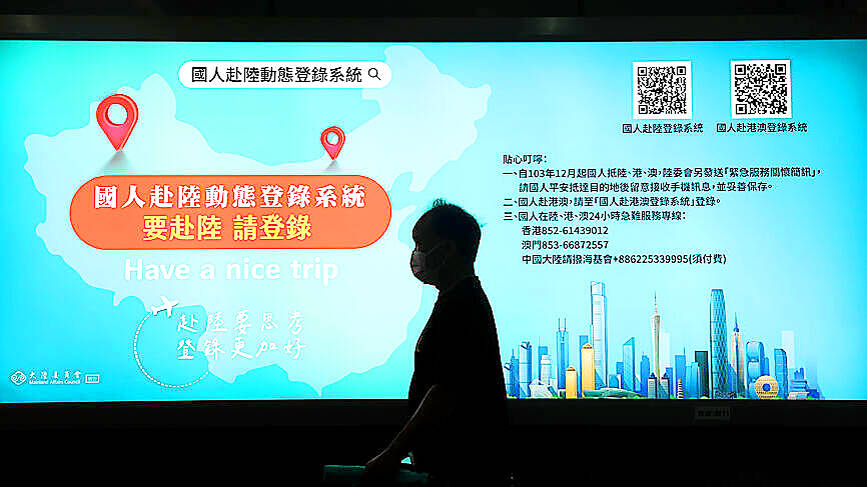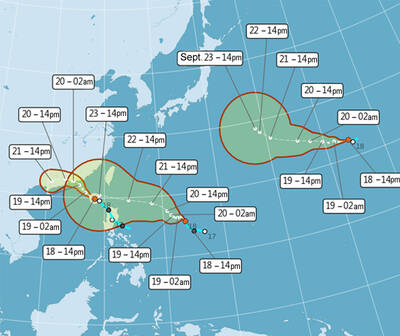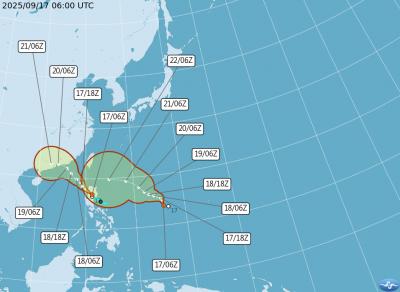Between January and last month, 94 cases related to the “personal safety” of Taiwanese businesspeople in China were recorded, the Straits Exchange Foundation (SEF) said yesterday.
Such cases include funeral arrangements and death compensation, restrictions on personal freedoms due to legal disputes, medical evacuations and issues involving lost or expired documents, the foundation said.
The figure represents a slight decline compared with the same period last year.

Photo: CNA
Separately, four Taiwanese members of the I-Kuan Tao (一貫道) religious group, all older than 70, remain in detention in China and are likely to face prosecution, it said.
The SEF is a semi-official agency set up by the Taiwanese government to handle civil and business affairs with China, but it does not have its own offices there.
In emergencies, it relies on local Taiwanese business associations to collect information and provide immediate support to affected people and their families, it said.
It also coordinates with its Chinese counterpart, the Association for Relations Across the Taiwan Straits, to help coordinate with the Chinese authorities when necessary.
Many cases involve business secrets or personal data, so details cannot usually be disclosed publicly, the foundation said.
While individual cases sometimes change, such as a person initially reported as “missing” later confirmed to have been arrested, its statistics do not retroactively update those classifications, it said.
The nature and causes of “missing” cases also vary, it added.
Some cases involve only a temporary loss of contact with family, while others concern people who have been detained without their relatives being informed, it said.
Once a family becomes aware of a detention, arrest, trial or house arrest, the nature of the case changes, it added.
After accepting a case, the foundation said it immediately reaches out to the person or their family to gather details and offer assistance.
Depending on the circumstances, the SEF might also issue reminders or anonymous warnings to other Taiwanese businesspeople living or working in China, it said.

NEW AGREEMENT: Malaysia approved imports last year after nearly two years of negotiations and inspections to meet quarantine requirements, officials said Up to 3.6 tonnes of pomeloes from Taiwan cleared Malaysian customs on Friday, in the first shipment of Taiwanese pomeloes to Malaysia. Taiwan-grown pomeloes are popular in domestic and overseas markets for their tender and juicy taste, the Ministry of Agriculture’s Animal and Plant Health Inspection Agency said. The fruit is already exported to Japan, Canada, Hong Kong, Singapore and the Philippines, it added. The agency began applying for access to the Malaysian market in 2023, compiling data on climate suitability, pests and diseases, and post-harvest handling, while also engaging in nearly two years of negotiations with Malaysian authorities and submitting supplementary

PEAK MONTHS: Data showed that on average 25 to 27 typhoons formed in the Pacific and South China seas annually, with about four forming per month in July and October One of three tropical depressions in the Pacific strengthened into a typhoon yesterday afternoon, while two others are expected to become typhoons by today, Central Weather Administration (CWA) forecaster Lee Ming-hsiang (李名翔) said yesterday. The outer circulation of Tropical Depression No. 20, now Typhoon Mitag, has brought light rain to Hualien, Taitung and areas in the south, Lee said, adding that as of 2pm yesterday, Mitag was moving west-northwest at 16kph, but is not expected to directly affect Taiwan. It was possible that Tropical Depression No. 21 would become a typhoon as soon as last night, he said. It was moving in a

A Taiwanese academic yesterday said that Chinese Ambassador to Denmark Wang Xuefeng (王雪峰) disrespected Denmark and Japan when he earlier this year allegedly asked Japan’s embassy to make Taiwan’s representatives leave an event in Copenhagen. The Danish-language Berlingske on Sunday reported the incident in an article with the headline “The emperor’s birthday ended in drama in Copenhagen: More conflict may be on the way between Denmark and China.” It said that on Feb. 26, the Japanese embassy in Denmark held an event for Japanese Emperor Naruhito’s birthday, with about 200 guests in attendance, including representatives from Taiwan. After addressing the Japanese hosts, Wang

One of two tropical depressions that formed offshore this morning could turn into a moderate typhoon by the weekend, the Central Weather Administration (CWA) said today. Tropical Depression No. 21 formed at 8am about 1,850km off the southeast coast, CWA forecaster Lee Meng-hsuan (李孟軒) said. It is expected to move in a northwesterly direction as it continues building momentum, possibly intensifying into Typhoon Mitag this weekend, she added. The radius of the storm is expected to reach almost 200km, she said. It is expected to approach southeast of Taiwan on Monday and pass through the Bashi Channel between Tuesday and Wednesday,